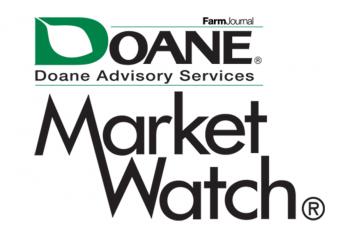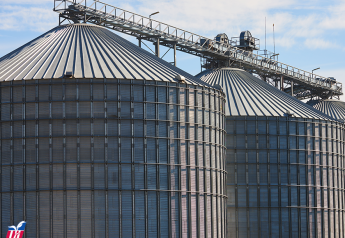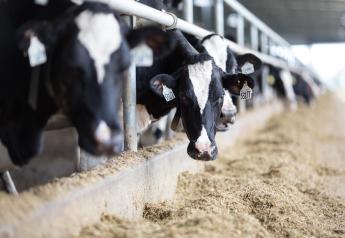House GOP Remains Stuck in Rut with Push to Boost McHenry as Interim Speaker

Farm bill extension gains ground | President Biden address nation tonight | Powell speaks
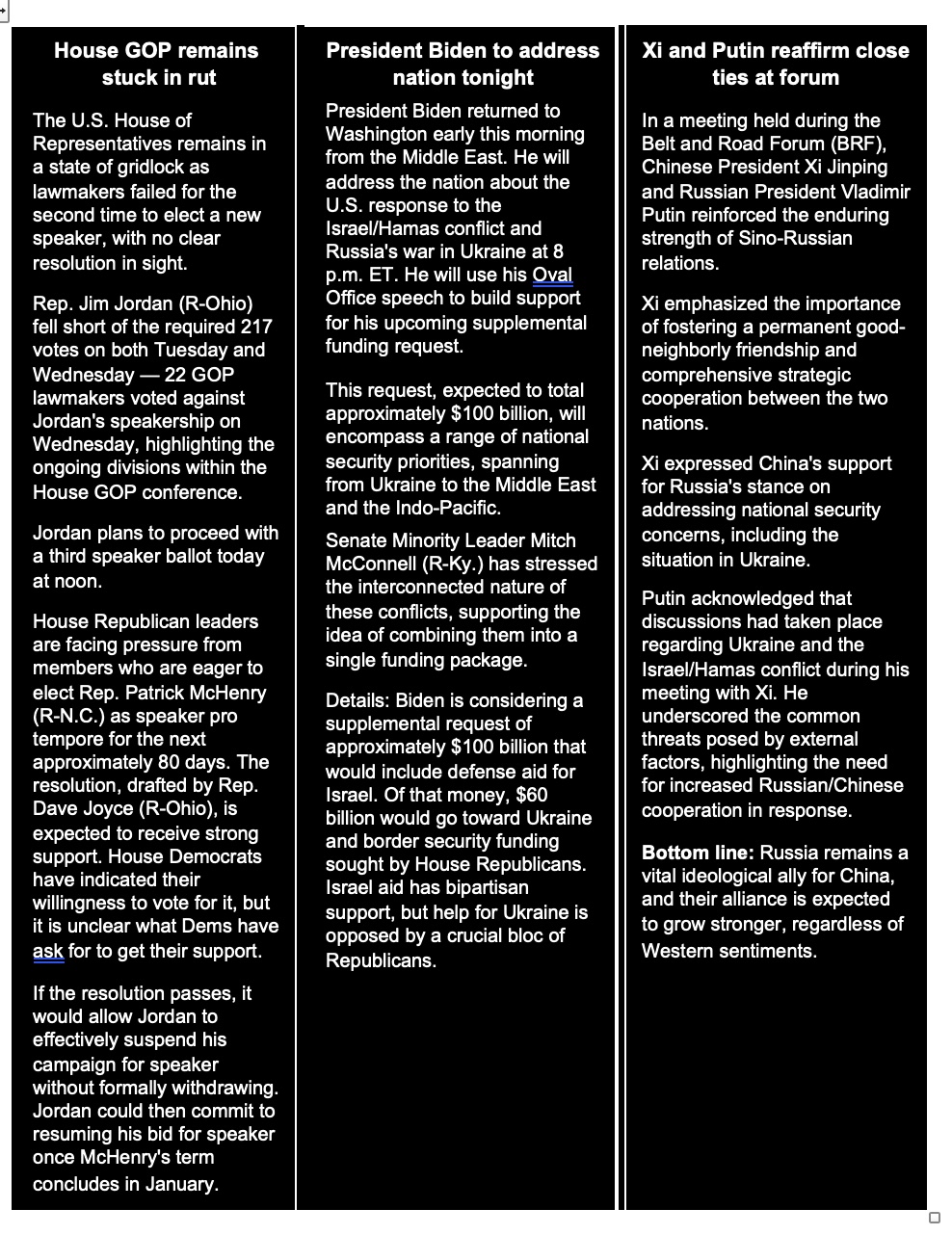
|
Today’s Digital Newspaper |
MARKET FOCUS
- Fed Chairman Powell speaks today at noon ET
- Fed Beige Book signals inflation easing but raises concerns about higher rates impact
- Treasury yields soar
- U.S. jobless claims fall to 9-month low.
- Average on the popular 30-year fixed mortgage rate hit 8% on Wednesday morning
- U.S. existing-home sales continue to decline, hitting lowest level in 13 years
- WTI crude dips below $88 amid technical correction as supply outlook uncertain
- Tesla reports 44% drop in Q3 net income, cites price cuts and warns of challenges
- Mexico revives century-old railway to challenge Panama Canal for container traffic
- Ag markets today
- Ag trade update
- Export sales for the week ended Oct. 12
- USDA’s FAS delays new export sales system until spring 2024
- NASS to make acreage changes for key crops in August
- Brazil to subsidize wheat trades
- India forecasts stable food prices for next two months amid adequate sugar stocks
- NWS weather outlook
- Pro Farmer First Thing Today items
ISRAEL/HAMAS CONFLICT
- Biden announces up to 20 trucks of aid for Gaza, including $100 Million in U.S. funding
RUSSIA & UKRAINE
- Putin: Arctic shipping route could be navigable year-round by 2024
POLICY
- House vacuum and shutdown concerns trigger talks of a one-year farm bill extension
- New farm bill could still be part of any late-year omnibus spending package
- Bill would expand access to USDA’s urban ag program and increase its funding
- Minimal changes to WOTUS regulation may lead to continued litigation: Sen. Capito
CHINA
- New crop wheat sales to China confirmed in latest weekly update
- China approves 51 genetically modified crops
- Don't rule out a financial crisis in China
- China is open to Xi/Biden summit at APEC, but lists four areas of 'core
- China's birthrate declines as effects of two-child policy fade
- China's soybean self-sufficiency pushes against global trade realities
- Chinese-owned pork producer Smithfield prepares for U.S. listing
- Chinese developer Country Garden misses payment on dollar bond, say creditors
TRADE POLICY
- USTR Tai to discuss U.S./EU trade issues with European Commission executive VP
ENERGY & CLIMATE CHANGE
- States explore mileage tax as solution to bridge federal highway funding gap
LIVESTOCK & FOOD INDUSTRY
- USDA sends final rule on livestock markets to OMB
- WSJ: Chinese-owned pork producer Smithfield considers U.S. listing
HEALTH UPDATE
- Pfizer more than doubles the cost of the Covid drug Paxlovid
POLITICS & ELECTIONS
- Trump leads Biden 47% to 43% among voters in the key swing states
- Trump endorses West Virginia Governor Jim Justice for U.S. Senate
|
MARKET FOCUS |
— Equities today: Asian and European stocks were mostly lower overnight. U.S. Dow opened around 20 points but at this writing is around 85 points lower. Stock benchmarks in China hit 2023 lows on Wednesday and fell further Thursday, weighed down by concerns about the fragile real-estate sector. In Asia, Japan -1.9%. Hong Kong -2.5%. China -1.7%. India -0.4%. In Europe, at midday, London -0.7%. Paris -0.4%. Frankfurt flat.
U.S. equities yesterday: All three major indices registered losses, unable to trade in positive territory the entire session. The Dow was down 332.57 points, 0.98%, at 33,665.08. The Nasdaq fell 219.44 points, 1.62%, at 13,314.30. The S&P 500 declined 58.60 points, 1.34%, at 4,314.60.
— Treasury yields soar. The 10-year Treasury yield reached a new high, breaking above 4.9% for the first time since 2007 — and is edging ever closer to 5%.
— Average on the popular 30-year fixed mortgage rate hit 8% on Wednesday morning, according to Mortgage News Daily. That's the highest level since mid-2000. Mortgage rates often follow loosely along with the 10-year Treasury. Accordingly, demand for home loans has plummeted.
— U.S. existing-home sales continue to decline, hitting lowest level in 13 years. Existing-home sales in the U.S. dropped for the fourth consecutive month, falling by 2% in September 2023. The seasonally adjusted annualized rate reached 3.96 million units, marking the lowest level since October 2010. While this decline aligns with a broader trend of a slowing housing market, it also reflects the impact of soaring mortgage rates, which have put pressure on demand for larger purchases. Despite the decrease, the result slightly exceeded market expectations, with a consensus forecast of 3.89 million units. These housing market challenges are consistent with the Federal Reserve's ongoing tightening campaign.
— Tesla reports 44% drop in Q3 net income, cites price cuts and warns of challenges for cybertruck production. Tesla has reported a 44% decline in its third-quarter net income, a more significant drop than anticipated by Wall Street analysts. The company's bottom line was negatively affected by ongoing price cuts across its vehicle lineup. While electric vehicle sales in the U.S. are increasing, the growth rate has slowed compared to previous years, leading to a buildup of unsold inventory. Additionally, Tesla issued a warning about the challenges it faces in scaling up production for its long-delayed Cybertruck. CEO Elon Musk acknowledged that the Cybertruck project has encountered difficulties, including cost overruns and design changes, making it a complex endeavor for the company.
— Agriculture markets yesterday:
- Corn: December corn rose 3 cents to $4.92, a high-range close.
- Soy complex: November soybeans rose 14 1/4 cents at $13.11, near the session high and hit a three-week high. December soybean meal gained $14.00 at $413.80, near the session high and hit a six-week high. December bean oil fell 49 points to 54.86 cents and nearer the session low.
- Wheat: December SRW rallied 9 3/4 cents before closing at $5.80 1/4. December HRW rose 3 3/4 cents before settling at $6.70 1/2, nearer the session low, while December spring wheat rose 5 3/4 cents to $7.33 1/2.
- Cotton: December cotton rose 101 points to 84.24 cents and near the session high.
- Cattle: Expiring October live cattle futures ended Wednesday having risen 22.5 cents to $185.725, while most-active December gained 32.5 cents to $187.20. The expiring October feeder contract fell $1.675 to $247.125, whereas November feeders slid 72.5 cents to $249.725.
- Hogs: December lean hog futures saw a narrow trading range Wednesday, ultimately rising 47.5 cents before settling at $68.025, nearer the session high.
— Ag markets today: Corn and wheat mildly favored the downside, while soybeans traded mostly higher in quiet, two-sided price action overnight. As of 7:30 a.m. ET, corn futures were trading fractionally to 2 cents lower, soybeans were steady to 4 cents higher in most contracts and wheat futures were 1 to 3 cents lower. Front-month crude oil futures were around $1.00 lower, and the U.S. dollar index was about 100 points lower this morning.
Slow developing cash cattle market. Packers have been slow to establish cash cattle bids, with only light sales reported so far this week at roughly $1.00 higher prices in the far northern market. Unless there’s a surprise development today, it’s likely the bulk of this week’s cash cattle activity will be pushed into Friday – and likely after USDA’s Cattle on Feed Report Friday afternoon.
Cash hog discount about average. The CME lean hog index is down another 45 cents to $80.70 (as of Oct. 17). After a modest 47.5-cent rise on Wednesday, December lean hog futures finished $12.675 below today’s cash quote. That’s roughly equal to the five-year average decline in the cash index from now until mid-December when the contract will be cash-settled.
— Quotes of note:
- China: “It is a good omen both for the Chinese and world economies that a more significant downturn seems to have been averted.” — Economist Eswar Prasad, the former head of the IMF’s China division
- 230: DAT Freight and Analytics’ index for truckload van demand in September, a 5.7% decline from August, helping send rates to their lowest levels since June 2020.
- Fed Chair Powell's remarks awaited as mixed economic signals challenge policy direction. Federal Reserve Chairman Jerome Powell is scheduled to deliver remarks today at noon ET, providing insights into the central bank's policy direction as it approaches its next policy-setting meeting in less than two weeks. The economic landscape presents a mixed bag of data, with inflation signals giving mixed messages, while job market and consumer activity data continue to outperform expectations. The bond market has expressed concerns about rising interest rates, and the recent Federal Reserve Beige Book (see related item) also noted that higher rates are impacting consumer and business activity. Powell's challenge is to navigate these mixed signals and convey a message that strikes a balance between being neither too hawkish nor too dovish regarding monetary policy actions.
Recent comments from Fed officials suggest a consensus around maintaining steady rates at the upcoming meeting concluding on November 1. However, the focus will be on the Fed's direction beyond that date. Powell is expected to reiterate the Fed's stance of remaining flexible based on incoming data, leaving the possibility open for no rate hikes in 2023 or further increases. Markets will be eager for any signals regarding 2024, with the Fed emphasizing that rates will remain higher for an extended period.
— USDA delays new export sales system until spring 2024, makes acreage changes for key crops in August. USDA announced a delay in the implementation of its new export sales reporting system, pushing the deployment to spring 2024 at the earliest. This decision comes after the Foreign Agricultural Service (FAS) encountered significant issues with their system in August 2022, leading to inaccuracies and missing reports. The earliest the new system will be operational is now set for spring 2024, according to a FAS official during the annual data users meeting.
Additionally, the National Agricultural Statistics Service (NASS) revealed plans to make acreage adjustments for crucial crops, including wheat, corn, and soybeans, in the August Crop Production report. These adjustments will be based on data collected from the Farm Service Agency (FSA), which farmers are required to report for participation in U.S. farm programs. Corn and soybean acreage will see further updates in September, with canola and sunflowers data being updated in October. This represents a shift from the USDA's previous practice of updating corn and soybean acreage in October before transitioning to September updates in 2022. Lance Honig, an official from NASS, expressed confidence in providing meaningful updates in August based on the available data.
— U.S. jobless claims fall to 9-month low. The number of Americans filing for unemployment benefits fell by 13,000 from the prior week to 198,000 on the week ending October 14, the least since January of 2023 and well below market estimates of 212,000. The result added to evidence that the labor market remains at historically tight levels, pointing to added resilience to the Federal Reserve’s aggressive tightening cycle and prolonging the period in which the central bank is expected to leave borrowing costs at restrictive levels
— Fed Beige Book signals inflation easing but raises concerns about higher rates impact. The Federal Reserve's Beige Book indicates that the pace of inflation is continuing to moderate, but there remains a widespread perception that prices remain high. Concerns are growing about the potential impact of higher interest rates on various sectors, including housing and automobiles, according to the report prepared by the St. Louis Fed.
While several Federal Reserve districts reported that inflation is moderating, they also highlighted that inflationary pressures continue to be a concern. Higher prices are affecting household balance sheets and limiting discretionary income, as noted by the New York Fed.
The report emphasizes the significance of higher interest rates as a major focus, with mentions of higher interest rates appearing more than 30 times throughout the text. Contacts expressed concerns that higher long-term interest rates were weakening economic outlooks for the next year, particularly impacting business conditions, according to the Minneapolis Fed.
The real estate/housing sector and the automobile industry are among those significantly affected by higher interest rates. Auto sales have slowed due to higher interest rates and increased vehicle prices, according to the Cleveland Fed. Homeownership affordability has deteriorated to record lows with rising prices and interest rates, as indicated by the Atlanta Fed.
While concerns about a potential recession were prevalent earlier this year, the current Beige Book suggests that fears of a recession are fading. However, there are still concerns expressed by some contacts about the potential for a recession, with many expecting a small decline in demand over the next year, as noted by the Chicago Fed.
In summary, the report may not prompt an immediate rate hike at the next Federal Open Market Committee (FOMC) meeting, but it underscores the importance of monitoring inflation and the potential consequences of higher rates on economic activity.
Market perspectives:
— Outside markets: The U.S. dollar index was weaker, with only the euro managing a slight gain against the greenback. The yield on the 10-year U.S. Treasury note was slightly firmer, around 4.96%, with a steady to firmer tone in global government bond yields. Crude oil futures were under pressure, with U.S. crude around $87.65 per barrel and Brent around $90.75 per barrel. Gold and silver were lower with gold around $1,964 per troy ounce and silver around $25.02 per troy ounce.
— WTI crude dips below $88 amid technical correction as supply outlook remains uncertain. WTI crude oil futures dropped below $88 per barrel on Thursday, signaling a likely technical correction following gains in the previous session. Investors are continuing to evaluate the global supply outlook. Oil prices had surged to two-week highs on Wednesday due to escalating turmoil in the Middle East, sparking concerns about potential disruptions to global supplies. Additionally, a larger-than-expected inventory draw reported by the U.S. had supported the rally. However, on Thursday, the market saw a slight retreat as OPEC showed no signs of endorsing Iran's call for an oil embargo on Israel. Furthermore, the U.S. issued a six-month license authorizing transactions in Venezuela's oil sector following an agreement between Venezuelan administration and opposition leaders to ensure fair elections in 2024.
— Mexico revives century-old railway to challenge Panama Canal for container traffic. Mexico's government is embarking on a project to revive a historic railway connecting the Gulf of Mexico to the Pacific Ocean, aiming to compete with the Panama Canal for container traffic, the Financial Times reports (link). The $2.8 billion Tehuantepec isthmus corridor will include a railway linking renovated ports at Salina Cruz in Oaxaca state and Coatzacoalcos in Veracruz, along with industrial parks near transport hubs. The project aims to attract multinational companies seeking proximity to the U.S. and take advantage of the Panama Canal's challenges, such as periods of low water levels due to frequent droughts in the region. Mexican President Andrés Manuel López Obrador envisions this project as part of an effort to draw investment to the economically disadvantaged southern regions of the country.
However, experts have raised concerns about the feasibility and challenges of the project. It may take years to build the necessary infrastructure and develop industries to attract global logistics players. International shipping companies, freight groups, and port terminal operators have not yet shown interest in the route.
— Export sales for the week ended Oct. 12:
- Corn: Net sales of 881,300 MT for 2023-24, which were down 3% from the previous week and 15% from the four-week average. Increases came primarily from Mexico, Guatemala and Colombia. Traders expected net sales between 500,000 MT and 1.1 MMT.
- Soybeans: Net sales of 1.372 MMT for 2023-24, up 30% from the previous week. Increases came primarily for China. Traders expected net sales between 950,000 and 1.625 MMT.
- Wheat: Net sales of 632,800 MT for 2023-24, down 3% from the previous week but up 42% from the four-week average. Increases came primarily for China and the Philippines. Traders expected net sales between 350,000 and 800,000 MT.
— Brazil to subsidize wheat trades. The Brazilian government allocated 400 million reais ($79 million) to subsidize wheat trades in 2023-24 in a bid to shore up prices. The plan is to guarantee trades at such a price level using an auction mechanism in which growers, wheat millers and traders can participate, the government said. The government set 87.77 reais ($17.36) per 60-kg bag as the minimum price for “type 1 loaf wheat” in the program, which is about 44% above current domestic prices.
— India forecasts stable food prices for next two months amid adequate sugar stocks. India's food secretary anticipates that food prices will remain steady over the next two months. Additionally, India reports having 5.7 million metric tons of sugar stocks as of Oct. 1, following the extension of restrictions on sugar exports. The country has implemented various measures in recent months to control food prices, including restrictions on the export of rice and wheat.
— Ag trade update: Japan purchased 89,873 MT of milling wheat, including 20,898 MT U.S. and 68,975 MT Canadian, and 10,146 MT of feed wheat.
— NWS weather outlook: Increasingly unsettled weather is in store for the eastern U.S. over the next few days… ...High temperatures will challenge daily records across numerous locations over the western U.S. today, spreading into Texas by Friday and into Saturday.

Items in Pro Farmer's First Thing Today include:
• Quiet overnight grain trade
• Weekly Export Sales Report out this morning
|
ISRAEL/HAMAS CONFLICT |
— Biden announces up to 20 trucks of aid for Gaza, including $100 Million in U.S. funding. President Joe Biden announced significant aid for Gaza, which includes up to 20 trucks of humanitarian assistance set to begin arriving on Friday. This aid, coupled with $100 million in new U.S. funding for Gaza and the West Bank, is poised to provide a critical lifeline to Palestinians in the besieged territory. The situation in Gaza remains dire, with urgent needs for water, food, fuel, and medicine.
During his visit to Israel, Biden reaffirmed U.S. support for the nation, negotiated the aid agreement, and made a heartfelt plea for Israelis not to be consumed by anger over the recent deadly Hamas attack.
Of note:
- Egypt has agreed to allow the passage of up to 20 trucks of humanitarian aid to Gaza, although the aid may not reach Gaza until Friday due to necessary road repairs beginning on Thursday.
- Recent polling indicates that a significant majority of U.S. voters believe supporting Israel is in the national interest, but many are concerned about the potential escalation of the conflict.
- The United States vetoed a U.N. Security Council draft resolution calling for a "humanitarian pause" in Gaza, coinciding with demonstrations in a Congressional office building demanding a ceasefire and an end to the war.
- Israel, the U.S. gov’t and independent security experts said Wednesday the preliminary evidence for a deadly explosion at a Gaza hospital compound pointed to a local militant group, casting doubt on Palestinian claims that an Israeli airstrike was responsible.
|
RUSSIA/UKRAINE |
— Putin: Arctic shipping route could be navigable year-round by 2024. Year-round navigation along the entire Northern Sea Route (NSR), a 3,500-mile shipping route in Russia’s Arctic economic zone, will be possible “as soon as next year,” Russian President Vladimir Putin said during the Third Belt and Road Forum in Beijing. Speaking at the opening ceremony of the forum on Wednesday, Putin said Russia welcomed interested countries to “get directly involved” in the development of the route, adding that Moscow will provide icebreaker escort, communications and supplies. Russia is also building a railway from inland towards its ports on the Artic Ocean as well as deepwater terminals at the eastern end of the NSR, to connect the route with its major logistics hubs, Putin said, according to the transcript of his speech from the Kremlin.
Background: The NSR, stretching from the eastern edge of the Barents Sea to the Bering Strait, is the shortest sea passage between Europe and Asia. The route has become an increasingly viable alternative to other passages connecting Europe and the Asia-Pacific region such as the Suez Canal, as melting Arctic ice caps are extending its navigable season.
In September, a first delivery of liquefied natural gas from Russia to China was made via the NSR, according to Russian energy giant Gazprom.
|
POLICY UPDATE |
— House vacuum and shutdown concerns trigger talks of a one-year farm bill extension. Key Senate Republicans are advocating for a one-year extension of the farm bill, signaling a shift away from hopes for a full-blown farm bill reauthorization this year. This change in focus is attributed to the current power vacuum in the House of Representatives and uncertainties surrounding the need to avert a government shutdown in November.
The next spending package needed to keep the government open past Nov. 17 “would really be a good opportunity to go ahead and put an extension on there,” the committee’s ranking Republican, John Boozman (R-Ark.), said in an interview with Bloomberg.
Other senior committee Republicans, including Sen. Chuck Grassley (R-Iowa), have also voiced support for a short-term farm bill extension. They argue that the uncertainty surrounding a five-year reauthorization is causing concern among farmers and community lenders who need to plan for the 2024 growing season.
However, Senate Ag Committee Chairwoman Debbie Stabenow (D-Mich.) maintains that it's premature to abandon the idea of a full five-year farm bill. She acknowledged that the situation in the House is problematic, with Republicans struggling to identify a successor after the removal of Speaker Kevin McCarthy (R-Calif.).
The Congressional Budget Office (CBO) will provide a new baseline estimate early in 2024. There are concerns that the new baseline estimate may not favor the resources needed for the five-year bill. Stabenow said pulling the plug now on the five-year reauthorization could have unintended consequences. “As I’ve indicated to colleagues, at the first of the year, the CBO gives us that new baseline, which may not be in our favor in terms of the resources” available for the five-year farm bill, she told Bloomberg. “So I feel a sense of urgency, and I’m hoping my colleagues will feel a sense of urgency to move” a five-year reauthorization “as soon as we can,” she said.
Comments: Do not rule out a new farm bill yet this year. There is an outside chance that a new five-year bill could be included in any omnibus spending measure, some contacts signal. That would avoid any farm bill amendments being offered, as well as some other advantages.
— Minimal changes to WOTUS regulation may lead to continued clean water act litigation, warns Sen. Capito. The Biden administration's minimal changes to the waters of the U.S. (WOTUS) regulation in response to a Supreme Court ruling have raised concerns that litigation over the Clean Water Act will persist. The Supreme Court's decision limited federal protection of wetlands to those with a "continuous surface connection" to larger bodies of water, a stricter definition compared to the previous "significant nexus" standard. This change has left many wetlands unprotected, leading to criticism and legal challenges.
Sen. Shelley Moore Capito (R-W.Va.) expressed worry that the administration's limited revisions could result in ongoing legal battles. At a Senate hearing held on the 51st anniversary of the landmark 1972 law, Capito said, “It will likely be up to the courts again to constrain administrative overreach or give us some clarity.”
The Supreme Court's ruling has created uncertainty around wetland protection, with some assessments suggesting that over half of the country's wetlands are no longer safeguarded. While there have been conflicting WOTUS rules across the Obama, Trump, and Biden administrations, the recent minimal changes have raised concerns about a lack of consistency in wetland protection.
Susan Bodine, a former EPA assistant administrator, agreed that litigation is likely to continue, citing potential challenges based on procedural grounds and non-compliance with the Supreme Court ruling. As a result of ongoing lawsuits, the revised WOTUS rule is currently in effect in 23 U.S. states but not in the remaining 27.
Mazeika Sullivan, a Clemson University professor, urged Congress to address the situation, stating that the Supreme Court's decision is not based on science and goes against the Clean Water Act's intent. Despite concerns, Bodine emphasized that recognizing limits on Clean Water Act jurisdiction does not necessarily mean all wetlands will be filled or waterways polluted, as there are numerous state and federal programs aimed at protecting water quality and wetlands.
— Two House Democrats filed a bill that would expand access to the USDA’s urban agriculture program and increase its funding from $15 million in 2024 to $50 million in 2028. Link for details.
|
CHINA UPDATE |
— New crop wheat sales to China confirmed in latest weekly update. USDA export sales data for the week ended Oct. 12 confirmed China's purchase of U.S. wheat, soybeans, sorghum and upland cotton. Sales activity for 2023-24 included net sales of 181,500 metric tons of wheat, 740 metric tons of corn, 130,683 metric tons of sorghum, 946,681 metric tons of soybeans and 20,686 running bales of upland cotton. No sales activity for 2024-25 was reported. For 2023, USDA said there were net sales reductions of 1,191 metric tons of beef and net sales of 1,960 metric tons of pork.
— China approves 51 genetically modified crops. After years of delay, China earlier this week granted preliminary approval for 51 genetically modified (GM) crops, marking a significant development for the country's agriculture sector. These approvals, which will become final after a 30-day comment period, open the door for seed companies to produce and sell 37 new GM corn varieties and 17 new soybean varieties to Chinese farmers in time for the upcoming spring planting season.
These approved GM crops come with various designer traits, including pest resistance, frost and heat tolerance, and compatibility with herbicides like glyphosate. Importantly, trials have demonstrated that these GM crops can deliver yields up to 12% higher than traditional varieties in some regions, promising a potential surge in homegrown corn and soybean production next year.
Notably, all of the approved GM crop varieties were reportedly developed by domestic Chinese companies, leading to a significant increase in their share values. This move is expected to reshape China's agricultural economy, with record-breaking corn and soybean yields anticipated for the coming year. Additionally, Chinese GM seed innovators will gain access to a vast new market.
Of note: Beijing's ambitions for its seed industry extend beyond its borders. Analysts anticipate Chinese seed companies will expand their presence into Southeast Asia, Latin America, and African markets, marking a broader global impact of China's GM crop approvals.
— China’s Country Garden closer to defaulting. Country Garden bondholders are seeking urgent talks with the troubled property developer after it missed a $15 million coupon repayment, putting it at risk of default, Reuters reported, citing three sources with direct knowledge of the matter. Ratings agency Moody’s said on Thursday it could downgrade Country Garden’s “corporate family rating” if the recovery prospects for its creditors weaken further. Moody’s said Country Garden’s senior unsecured rating of C was already at the lowest of its rating scale.
— Don’t rule out a financial crisis in China. Extensive fiscal and financial imbalances have taken China, its leadership and the world into uncharted territory. Link for details via the Wall Street Journal.
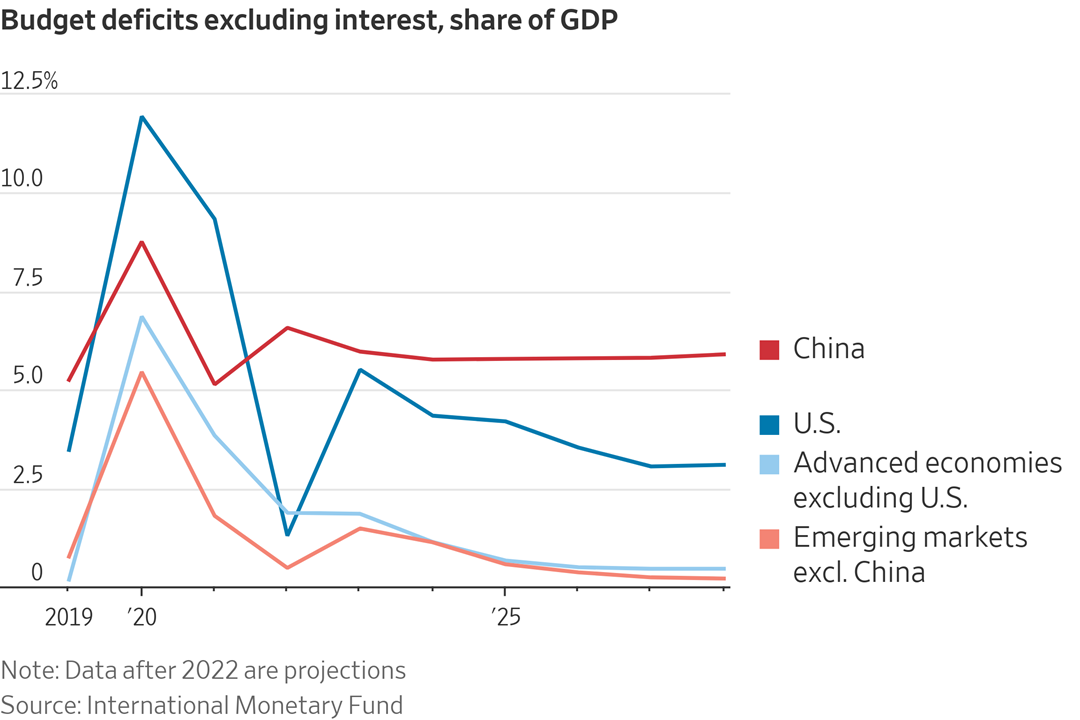
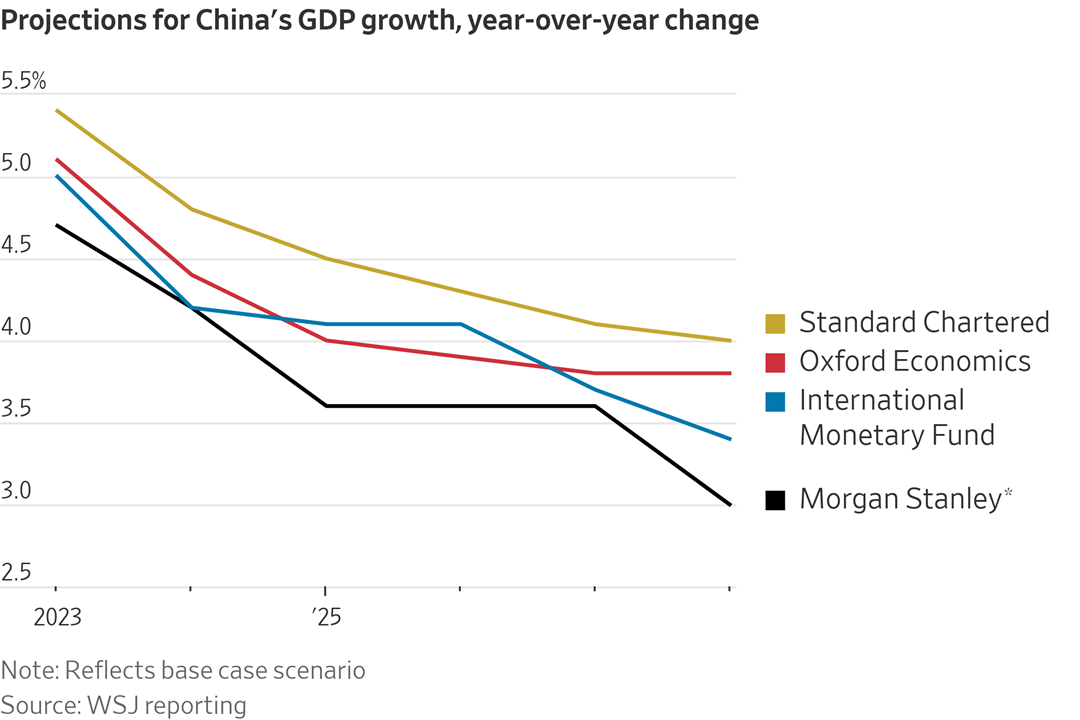
— China is open to Xi/Biden summit at APEC, but lists four areas of ‘core interests’. China expressed its willingness to hold a summit between President Xi Jinping and President Joe Biden on the sidelines of the upcoming Asia-Pacific Economic Cooperation (APEC) summit in San Francisco in November. However, this willingness is contingent on the United States demonstrating respect, according to Xu Xueyuan, deputy chief of mission of the Chinese Embassy in the U.S. Xu emphasized the importance of mutual respect in the bilateral relationship and outlined four areas related to China's "core interests" that the U.S. should consider:
- Taiwan
- Democracy and human rights
- China's development path and its political and economic system
- China's right to development
Xu also highlighted the need for the U.S. to acknowledge China's efforts in its economic rise and development. She mentioned that while China appreciates past U.S. assistance, it has been unfairly portrayed as a scapegoat for domestic issues in recent times.
On a lighter note, Xu mentioned the role of giant pandas in China's diplomacy and hinted at the possibility of panda diplomacy playing a part in future negotiations.
— China's birthrate declines as effects of two-child policy fade. China's birthrate declined, indicating the diminishing impact of the country's two-child policy, which was implemented in 2016. In 2022, a total of 9.56 million babies were born in China, marking a 10% decrease from the previous year, the National Health Commission said Thursday. Births are expected to continue declining despite the government's shift from birth restrictions to encouraging couples to have three children.
The number of first, second, and third children all decreased compared to 2021, reflecting a declining number of women of childbearing age and a lower fertility rate. In 2022, 46.1% of births were the family's first child, up from 44.1% in 2021, while the share of second children fell to 38.9% from 41.4%. The percentage of third children or higher increased to 15%, but the absolute total declined from 2021.
The declining fertility rate is attributed to the sharp decrease in the number of women of childbearing age, mainly born in the 1980s and 1990s, as a result of the one-child policy. Women aged 15 to 49 currently number around 300 million, down 20% from 2010.
Several demographers predict that China's population has peaked, and negative population growth is inevitable and irreversible. While there may be occasional rebounds in the future, the overall trend is toward population decline in the long run.
To address this issue, scholars suggest that China's policies, social norms, and family traditions need to be adapted to current and future population development trends. The government has been experimenting with policies to encourage higher birthrates, including extended parental leave and financial incentives in some regions.
— China's pursuit of food security: Soybean self-sufficiency pushes against global trade realities. China is making efforts to boost its soybean production to reduce reliance on imports, particularly from the United States and Brazil, the Financial Times reports (link). Soybeans are essential for both human and animal consumption, and China imports more than 80% of its soybeans to meet the demand for animal feed, primarily in the pork industry.
Hurdles persist. Despite initiatives to increase domestic soybean production, challenges such as higher production costs and lower yields compared to foreign suppliers persist. The drive for food security, however, remains a top priority for the Chinese government, especially considering recent global events and climate-related concerns. Experts suggest that while China is making strides in domestic production, market forces and the country's fragmented agricultural sector present challenges to achieving full self-sufficiency.
Bottom line: With extreme weather events and rising temperatures posing threats to agricultural production, food security will likely remain a significant focus for China in the coming years.
|
TRADE POLICY |
— USTR Tai to discuss U.S./EU trade issues with European Commission executive vice president. U.S. Trade Representative (USTR) Katherine Tai i will deliver remarks at the Export-Import Bank Annual Conference, “Create Locally, Export Globally.” She is also set to meet with European Commission Executive Vice President Valdis Dombrovskis to discuss various U.S./EU trade issues.
|
ENERGY & CLIMATE CHANGE |
— States explore mileage tax as solution to bridge federal highway funding gap. The primary federal account responsible for funding highways and transit projects may face depletion by 2028 unless Congress addresses longstanding issues with the gas tax. According to Chad Shirley, an analyst for the Congressional Budget Office (CBO), the short-term influx of funds from the 2021 infrastructure law is projected to run out in five years. This situation will force Congress to decide whether to increase transportation taxes, reduce spending, or utilize other federal resources to cover the funding gap.
The core problem lies in how the federal government finances surface transportation projects, relying on gas and diesel taxes to fill the Highway Trust Fund. However, these tax rates have not been raised since 1993, despite increased vehicle fuel efficiency and reduced year-to-year driving increases. Over the past 15 years, Congress has redirected $275 billion from other federal accounts to bolster the Highway Trust Fund, with $118 billion diverted from general funds in the 2021 infrastructure law.
The funding gap is widening, with projected federal surface transportation spending of $65 billion annually, while expected revenues will only bring in $37 billion per year. The CBO predicts a cumulative gap of $241 billion by 2033, with the situation exacerbated by the rising popularity of electric vehicles.
In response, some states are exploring mileage taxes as an alternative to per-gallon fuel taxes. Oregon and Washington state have been at the forefront of such efforts. These mileage taxes are seen as a modernization necessary to shift the focus to road usage rather than fuel consumption. They could also be structured to assist low-income drivers, a flexibility not possible with gas taxes.
At the federal level, the CBO suggests several options to address the Highway Trust Fund shortfall, including increasing the gas tax by 15 cents per gallon, introducing a mileage fee like state experiments, or implementing a specific tax for electric vehicles. These measures aim to ensure highway users contribute more fully to the costs associated with road maintenance and infrastructure.
|
LIVESTOCK, FOOD & BEVERAGE INDUSTRY |
— USDA sends final rule on livestock markets to OMB, aims to promote ‘inclusive competition’. USDA submitted a final rule titled "Inclusive Competition and Market Integrity Under the Packers and Stockyards Act" to the Office of Management and Budget (OMB). This rule encompasses "proposed revisions" to regulations under the Packers and Stockyards Act (PSA), with the objective of promoting inclusive competition and market integrity within the livestock, meats, poultry, and live poultry markets.
The final rule follows the publication of a notice of proposed rulemaking in 2022, which garnered multiple extensions for the comment period, concluding in January 2023. The Agricultural Marketing Service has clarified that the rule includes "supplemental amendments" aimed at defining conduct that USDA considers "unfair, preferential, unjustly discriminatory, or deceptive, and a violation of the PSA." It also seeks to clarify criteria and types of conduct that would be viewed as "unduly or unreasonably preferential, advantageous, prejudicial, or disadvantageous, and violations of the Act, including retaliatory practices that interfere with lawful communications, assertion of rights, and associational participation."
Notably, USDA has another final rule related to transparency in poultry grower contracting and tournaments currently under review at OMB. Despite scheduled meetings concluding by late September, it remains uncertain when either rule will be published, as the recently submitted rule was originally targeted for finalization in September.
— WSJ: Chinese-owned pork producer Smithfield considers U.S. listing amid challenging industry conditions. Smithfield Foods, the largest pork producer in the United States, is reportedly in discussions about a potential return to the U.S. stock market, the Wall Street Journal reports (link). The Chinese parent company of Smithfield, WH Group, is collaborating with banks to explore the possibility of taking the business public in the U.S. once again, with the listing potentially occurring as early as next year. However, deliberations are ongoing, and the timing may change.
Smithfield Foods was acquired by China's top meat producer in 2013, resulting in its delisting from the New York Stock Exchange. Following the acquisition, the combined entity became the world's largest hog farmer and pork producer and went public in Hong Kong in 2014. Nonetheless, WH Group's shares have faced challenges and are currently trading near record lows, mainly due to an African swine fever outbreak in China in 2018, which significantly impacted hog herds. The U.S. pork industry experienced growth in exports following the outbreak, but these exports have declined in recent years as China rebuilt its hog population, leading to an oversupply of pork in the U.S. High livestock feed prices due to global events, such as Russia's invasion of Ukraine, have compounded challenges for the industry.
Smithfield's potential return to the U.S. stock market comes amid concerns in Washington about Chinese ownership of key components of the U.S. food supply chain. Smithfield CEO Shane Smith has defended the company's Chinese ownership, stating that it has helped boost sales.
Of note: While Smithfield's listing discussions are ongoing, other major meat companies, like Brazil's JBS, are also considering U.S. listings amid challenging conditions in the meat industry.
|
HEALTH UPDATE |
— Pfizer more than doubles the cost of the Covid drug Paxlovid. The pharmaceutical giant raised the list price for a five-day treatment of the antiviral to $1,390, from the $529 that the U.S. government currently pays. Though health plans will probably pay less than that, Pfizer’s move is likely to draw criticism that the higher price will limit access to the lifesaving drug.
|
POLITICS & ELECTIONS |
— Trump leads Biden 47% to 43% among voters in the key swing states of Arizona, Georgia, Michigan, Nevada, North Carolina, Pennsylvania, and Wisconsin as voters reject the economic message that is central to Biden’s reelection bid, according to a poll by Bloomberg News and Morning Consult. A 51% majority of swing state voters said the national economy was better off during the Trump administration, and similar numbers said they would trust Trump over Biden on the economy going forward, 49% to 35%. Among independent voters, the chasm on trust to handle the economy is even wider, with a 22-point advantage for Trump.
— Trump endorses West Virginia Governor Jim Justice for U.S. Senate, setting up potential showdown with Manchin. Former President Donald Trump has endorsed West Virginia Governor Jim Justice for the U.S. Senate, giving Justice an advantage in the GOP primary race against Rep. Alex Mooney. The move sets the stage for a possible electoral showdown with Democratic Senator Joe Manchin, whose future political plans remain uncertain. Republicans view Manchin's Senate seat as a top target as they aim to regain control of the Senate. Jim Justice is already considered a formidable challenger in the upcoming election.
|
KEY LINKS |
WASDE | Crop Production | USDA weekly reports | Crop Progress | Food prices | Farm income | Export Sales weekly | ERP dashboard | California phase-out of gas-powered vehicles | RFS | IRA: Biofuels | IRA: Ag | Student loan forgiveness | Russia/Ukraine war, lessons learned | Russia/Ukraine war timeline | Election predictions: Split-ticket | Congress to-do list | SCOTUS on WOTUS | SCOTUS on Prop 12 pork | New farm bill primer | China outlook | Omnibus spending package | Gov’t payments to farmers by program | Farmer working capital | USDA ag outlook forum | Debt-limit/budget package |

